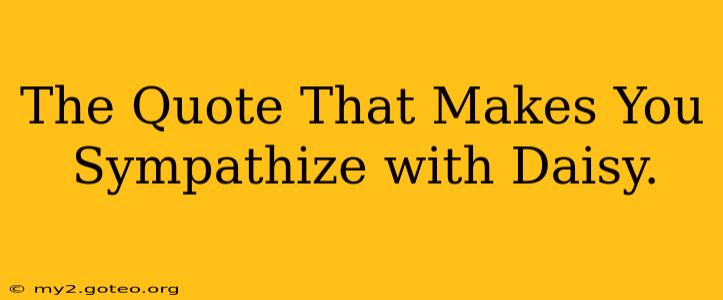The Quote That Makes You Sympathize with Daisy Buchanan: Unpacking the Tragedy of The Great Gatsby
F. Scott Fitzgerald's The Great Gatsby is a masterpiece of American literature, leaving readers captivated by its tragic romance and exploration of the American Dream. While Jay Gatsby is often viewed as the novel's tragic hero, Daisy Buchanan, his elusive love interest, evokes a complex mixture of fascination and frustration. Many readers find themselves grappling with their feelings toward her—a mixture of condemnation and, surprisingly, sympathy. One particular quote encapsulates this complex character and allows for a deeper understanding of the tragedy that ultimately befalls her: "That's the best thing a girl can be in this world, a beautiful little fool."
This seemingly simple statement, uttered by Daisy herself, reveals a profound truth about her character and the societal constraints she faces. It's not just a confession of her own perceived limitations; it's a chilling indictment of the limited options available to women in the Jazz Age. Let's delve deeper into why this quote sparks sympathy for Daisy and how it contributes to the overall narrative.
Why is Daisy's Quote So Resonant?
This quote instantly reveals Daisy's awareness of her own superficiality, but more importantly, it highlights the societal pressure that forced her into this role. To be beautiful and foolish was, in her eyes, a strategic survival mechanism within a patriarchal society that valued women primarily for their appearance and lacked opportunities for intellectual or professional fulfillment. Her statement isn't a celebration of ignorance; it's a heartbreaking admission of the limitations she perceived as inescapable.
What Does It Mean to Be a "Beautiful Little Fool"?
The phrase "beautiful little fool" is multi-layered. On the surface, it suggests a life of privilege and ease, seemingly free from the responsibilities and burdens of intellectual engagement. But it also subtly exposes the hollowness and emptiness of such a life. Daisy's beauty, while undeniably a significant asset in her social circle, ultimately traps her in a cycle of superficial relationships and emotional stagnation. She is admired, desired, but not truly seen or understood for who she is beyond her appearance.
How Does This Quote Contribute to Our Sympathy for Daisy?
This quote humanizes Daisy in a way other aspects of her character don't. While her actions – particularly her refusal to leave Tom and her reckless behavior – are often criticized, the quote provides context. It paints a picture of a woman trapped by societal expectations and her own limited choices. Her remark isn't an attempt to justify her actions, but rather a poignant acknowledgement of her own limitations within a restrictive system. It reveals a deep-seated sadness and a sense of resignation, eliciting sympathy from the reader who recognizes the societal forces that shaped her.
Does Daisy Choose This Path?
While the quote suggests a resignation to her fate, it's crucial to consider whether Daisy actively chooses this role or is passively molded by her environment. The novel leaves room for interpretation. Some argue that Daisy consciously embraces the role of the "beautiful little fool" as a shield against the complexities of life, a way to avoid the responsibility of making difficult decisions. Others suggest that she is a victim of circumstance, forced into a role by societal expectations and the constraints placed upon women of her time.
Isn't Daisy Responsible for Her Actions?
Absolutely. The quote doesn't excuse Daisy's actions. She makes choices that have devastating consequences, affecting not only herself but those around her. However, the quote provides crucial context, allowing us to understand the societal pressures and limited options that contributed to her decisions. Sympathy doesn't mean condoning her actions; it means acknowledging the complexities of her character and the constraints of her time.
Ultimately, Daisy's declaration, "That's the best thing a girl can be in this world, a beautiful little fool," serves as a powerful indictment of a society that limited women's opportunities and simultaneously reveals a woman acutely aware of her own limitations within that system. It's a quote that lingers long after finishing the novel, prompting reflection on the societal pressures that shape individual lives and the tragic consequences of a system that denies women agency and self-determination. It's this very understanding that allows for a deeper, more compassionate, and ultimately more nuanced understanding of Daisy Buchanan.

